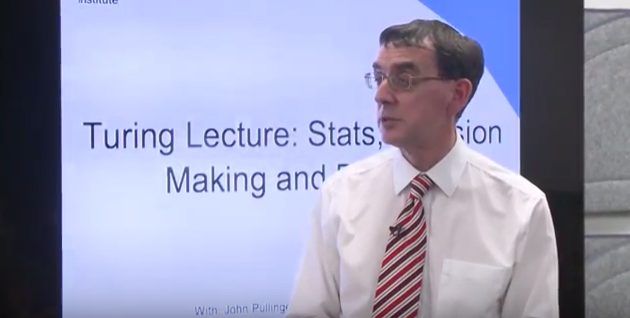John’s Turing Lecture: Mobilising the power of data to help Britain make better decisions

“When I wrote the introductory post in this blog a few weeks ago, I said that our purpose was to mobilise the rapidly expanding power of data to help Britain make better decisions. Earlier this month I set out my thoughts on that in more detail when I was privileged to give the fourth Turing Lecture at the Alan Turing Institute, Britain’s national institute for data science, which was created in 2015 in order to answer the national need for investment in data science research.
I told the audience that the community of data users needs to step up and realise that we have a richness of data that did not exist before. We need to step forward into the policy space and bring the insight that we can get from the data at our disposal to the decisions that affect the future of our country. And we need to step on the gas because the world is changing, and the data world is changing too. Those data riches are multiplying almost before our eyes: not just its quantity but also its value, in our ability to analyse and draw meaning from that data.
Step up, step forward and step on the gas
But we need to bear in mind respect and value. We must remember that data is information about individuals and businesses, and reveals things about them. We must respect privacy, the need for security and the ethics of what we are examining. Indeed, while I have tried as National Statistician to reduce the processes in government bureaucracy so as to allow our staff to get on with their jobs, one thing I have introduced is the National Statistician’s Data Ethics Committee.
If we get this right, we can create arguably untold value for the public good from the data estate that is increasingly becoming available to us. There are opportunities here to make better policy decisions, for example by helping us as a country to understand the economy better. In many cities we are getting better at mobilising transport data to help travellers plan their journeys better. During the floods earlier this year, better use of real-time data on rising water levels could be combined with Ordnance Survey mapping information to allow better deployment of the emergency services in response.
A global impact in data science
Before giving the lecture, I signed a memorandum of understanding with the Alan Turing Institute, signalling our shared commitment to creating a global impact in data science through research, training and leadership. Researchers from ONS and the Institute will meet in 2017 to explore collaborative projects.
This all comes at an exciting time for ONS and its involvement in making better use of data. The new Data Science Campus in Newport opens up many possibilities of working together with respected leaders in the field, such as the Alan Turing Institute, to develop research and innovation, and to improve and exchange knowledge and skills. And, as Heather Savory reported in her recent post on this blog, ONS has recently taken on the UK’s first eight data apprentices in Newport. They are joining a unique career pathway that will see them use cutting-edge tools and technologies to provide statistics and insights to help shape policy across the country.
I wish all the users of our data a very merry and restful Christmas looking forward to the further developments that 2017 will surely bring.”
John Pullinger, National Statistician
You can see a video of John’s lecture on the Alan Turing Institute Youtube channel. To read more about the MOU with the Alan Turing Institute, go to the ONS website. The ONS website also has more information about the data science campus in Newport and the new ONS data apprentices.
Feedback to the Editor